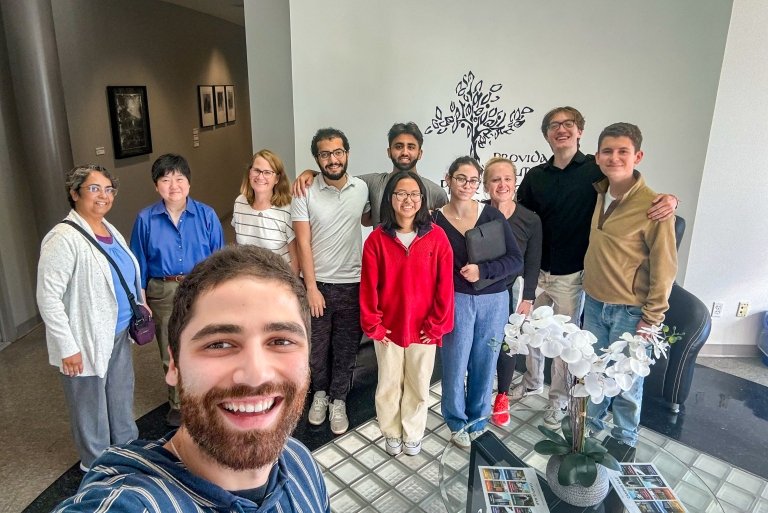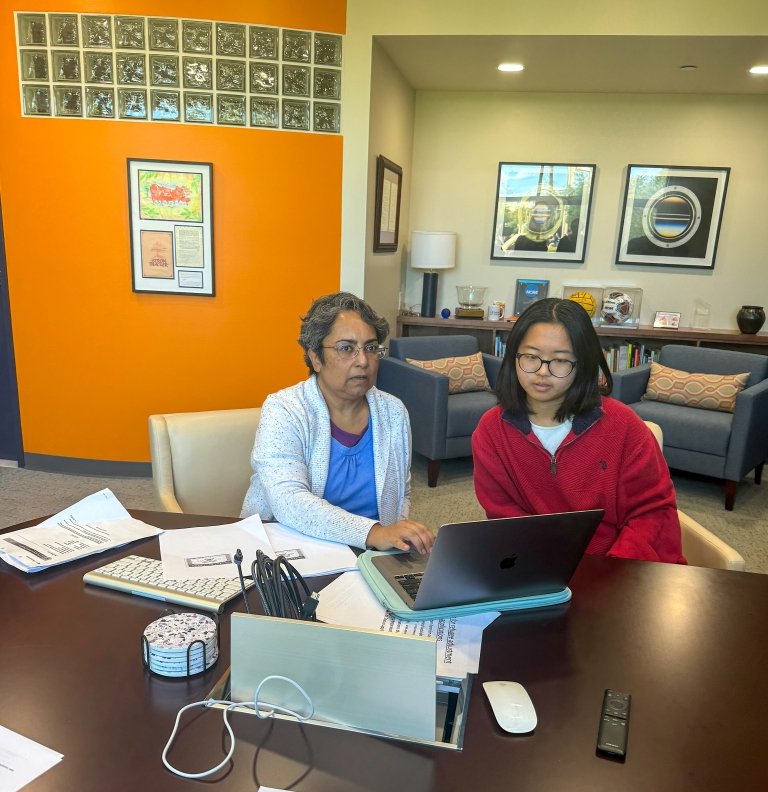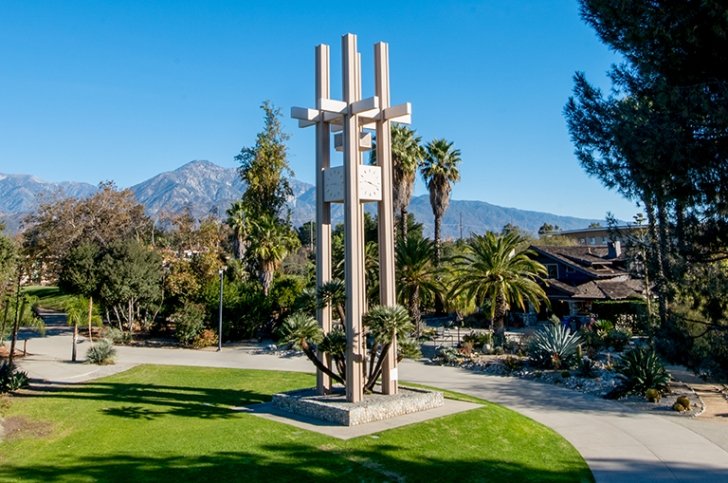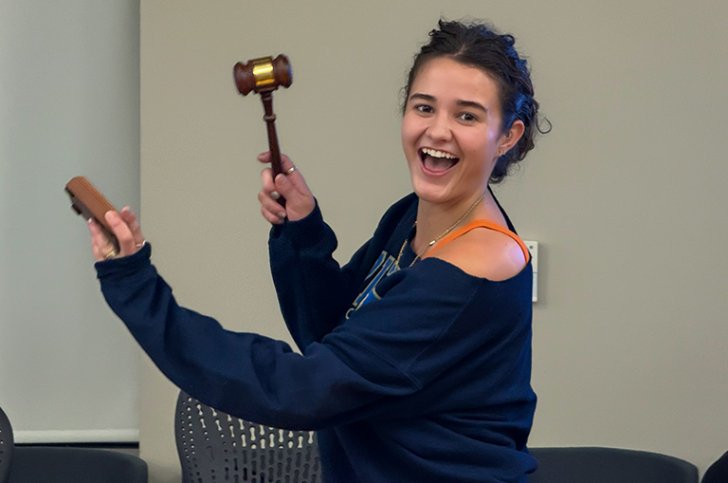Legal Clinic Offers Expertise As Well As Inspiring Lessons for Refugees and Students
A Pitzer trio of lawyers, assisted by Claremont Colleges students, provided local refugees with critical help in filling out green card applications.

For many refugees, the road to citizenship is long and arduous, and legal help navigating the paperwork is expensive and hard to find.
But on a recent fall morning at Pitzer College, a group of Syrian refugees found the help they needed at the right price.
The College partnered with Claremont Canopy, a local organization committed to serving refugee families in the Claremont area, to host a special legal clinic offering free assistance to primarily Syrian families. The goal was to help them with the bewildering paperwork involved in applying for green card status or citizenship.
Moving from refugee status to green card status is a big leap that can be fraught with obstacles, explained Isabelle Thacker, one of the clinic’s organizers.
“There are a number of agencies that do work with low-income people on applications like this, but the lines are long, and immigrants can be preyed on by unscrupulous lawyers,” said Thacker, an immigration rights lawyer who arrived at Pitzer in 2023 with husband Strom, who became the College’s seventh president. “That’s why we wanted to do this. We wanted to create a situation in which they could feel safe and get the help they needed.”
In November, several local refugee families—more than 14 people in all—visited the second-floor offices of Pitzer’s main administrative building to get help from a team of lawyers assisted by interpreters and student interns.
A trio of lawyers—Thacker, Sumangala Bhattacharya, and Sharilyn Nakata—worked with the families and supervised a group of undergraduates from Pitzer and the other Claremont Colleges in working on the application process and communicating with families via interpreters if needed.
For Bhattacharya, who is an immigration attorney with her own “low-bono” law firm, Upland-based ImmPowered Law Office, the clinic’s impact on student volunteers was also important.
“When our undergrads realize the extent that knowing English and being computer literate gives them a superpower to help others access statutorily available immigration options, it’s really powerful,” explained Bhattacharya, who is also a professor of British literature at Pitzer. “They discover that they’re a bridge between these folks and the relief that’s available but that they just can’t reach. I think it shows them what their education is really all about and what they should be doing with it.”
For Christy Anderson, who founded Claremont Canopy in 2017 and serves as its executive director, partnering with institutions like Pitzer and the rest of The Claremont Colleges has been crucial to her organization’s effectiveness.
“We’re really lucky having resources of Pitzer and the other colleges,” she said. “With this legal clinic, we’ve been able to have access to resources that other similar organizations across the country just don’t have. It’s been like having our own staff lawyers, and you really need that kind of help when you’re helping these families start their lives over. They run into so many obstacles, and it means so much to have legal support on the ground.”

Addressing a Critical Need
A U.S. green card permits immigrants to live and work in the United States. After five years of having a green card, they can start the naturalization process. This card makes the holder a permanent resident of the United States, entitled to some of the same benefits as citizens, such as the ability to live and work here, and travel abroad without needing a visa to re-enter the U.S. Refugees are eligible for this status after spending one year in the U.S. following a rigorous overseas vetting process.
According to various immigration assistance organizations, each year the U.S. government issues more than one million green cards. However, as Bhattacharya points out, the cost of legal help with the process can cost families anywhere from $3,000 per member or more, which is a daunting sum for these families.
“Here you have people who are trying very hard to get on the path for legal status, and the costs of private attorneys are so high,” she said. “When our conversation first started about doing something, we asked some simple questions: What could we do to improve the situation for these families? What could we do to help them with these costs?”
Thacker agreed, adding that the immigration process can be very complex and prolonged. Working on green card paperwork is an ideal response, she said, “because it gives you a very discrete way to help with a crucial step. It makes it possible for our students to get involved in a helpful, useful way that won’t require the kind of long-term commitment that other steps in the process sometimes require.”
Seeing an Opportunity
Before her arrival at Pitzer, Thacker had served as supervising attorney in the Immigration Unit at The Legal Project in Albany, New York. That unit focused on providing humanitarian relief to immigrants. When Bhattacharya learned about Thacker’s background, she saw an opportunity to put Pitzer’s mission of social responsibility into action with her.
“I saw her background and thought, here’s someone finally who understands this area and can work with me,” explained Bhattacharya. She said she was especially pleased to work with Thacker and Nakata on creating a clinic that would show student interns that they can have a big impact on people’s lives with the kinds of basic skills too often taken for granted.

It was a personal connection of Thacker’s that resulted in the partnership with Claremont Canopy. Her cousin, Jennifer Stark ’98, a member of Claremont’s city council, also sits on that organization’s board and is a friend of Anderson’s. It was Stark who suggested Thacker’s legal experience might be a good fit for Claremont Canopy’s legal needs.
Anderson said the three lawyers’ involvement provided her—and her families—with some much-needed relief.
“I could try to help our families fill out the paperwork, but I’m not a lawyer and I cannot give legal advice,” she said. “But with Isabelle, Sumangala, and Sharilyn on board, I didn’t have any doubt. When we ended the clinic, we could turn to the refugee families and tell them, ‘Here, you’re all set; you’re ready to put these in the mail.’ It was phenomenal. This was our first legal clinic with Pitzer, and hopefully there will be more to come.”
Thacker agreed.
“I think Sumangala, Sharilyn, and I would be up to try this again,” she said. “The main thing is that we want to find ways to be helpful to these families. This legal clinic was a good first step.”
(Photo at top of article: Lawyers Sumangala Bhattacharya, Shari Nakata, and Isabelle Thacker (back, from left) and Claremont Canopy Director Christy Anderson (back, third from right) were joined for a group selfie by students from Pitzer and the other Claremont Colleges for a special legal clinic to assist local refugees.)
News Information
Published


